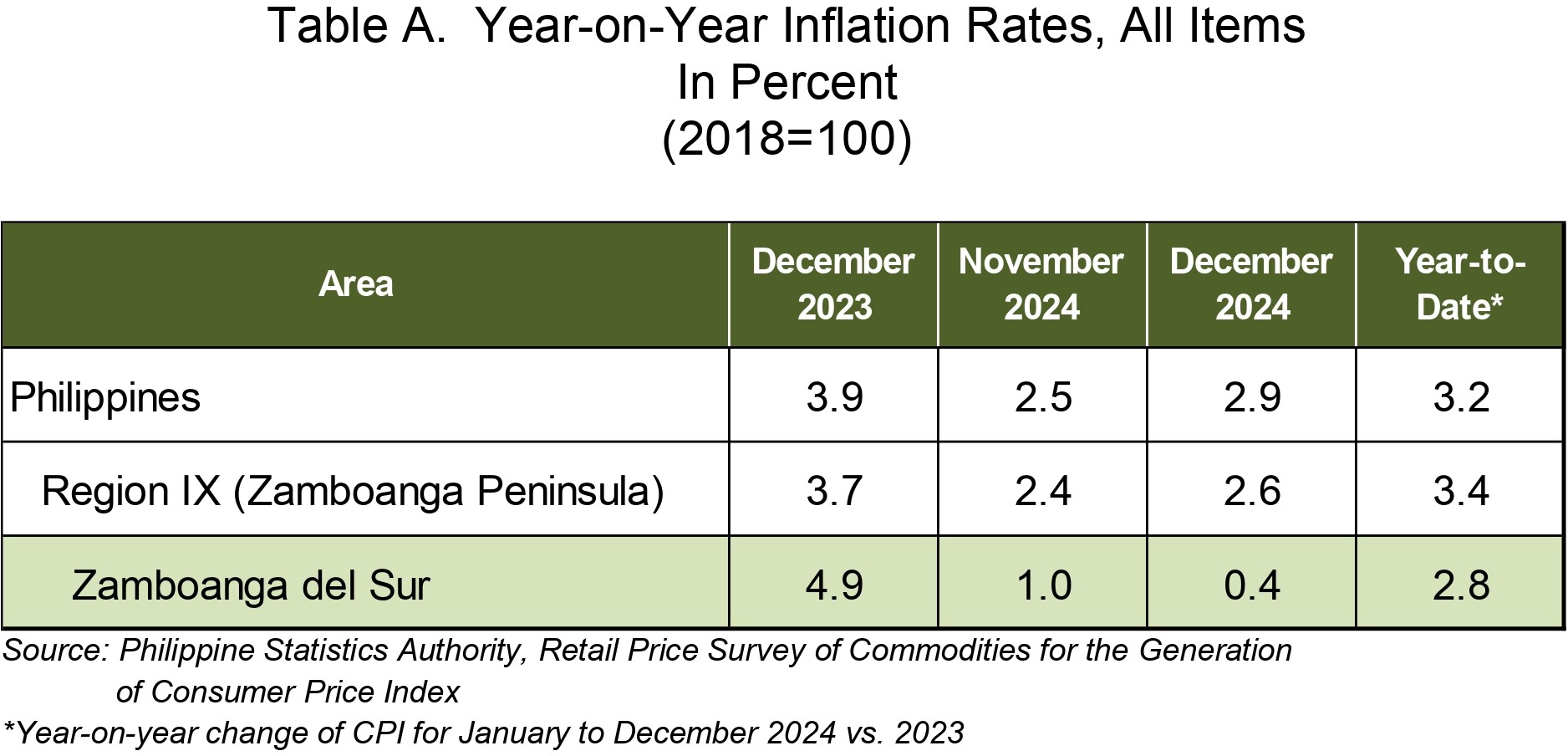
1. Headline Inflation
Zamboanga del Sur’s headline inflation or overall inflation decreased to 0.4 percent in December 2024 from 1.0 percent in November 2024. In December 2023, the inflation rate was posted at 4.9 percent. (Tables A and B, and Figure 1)
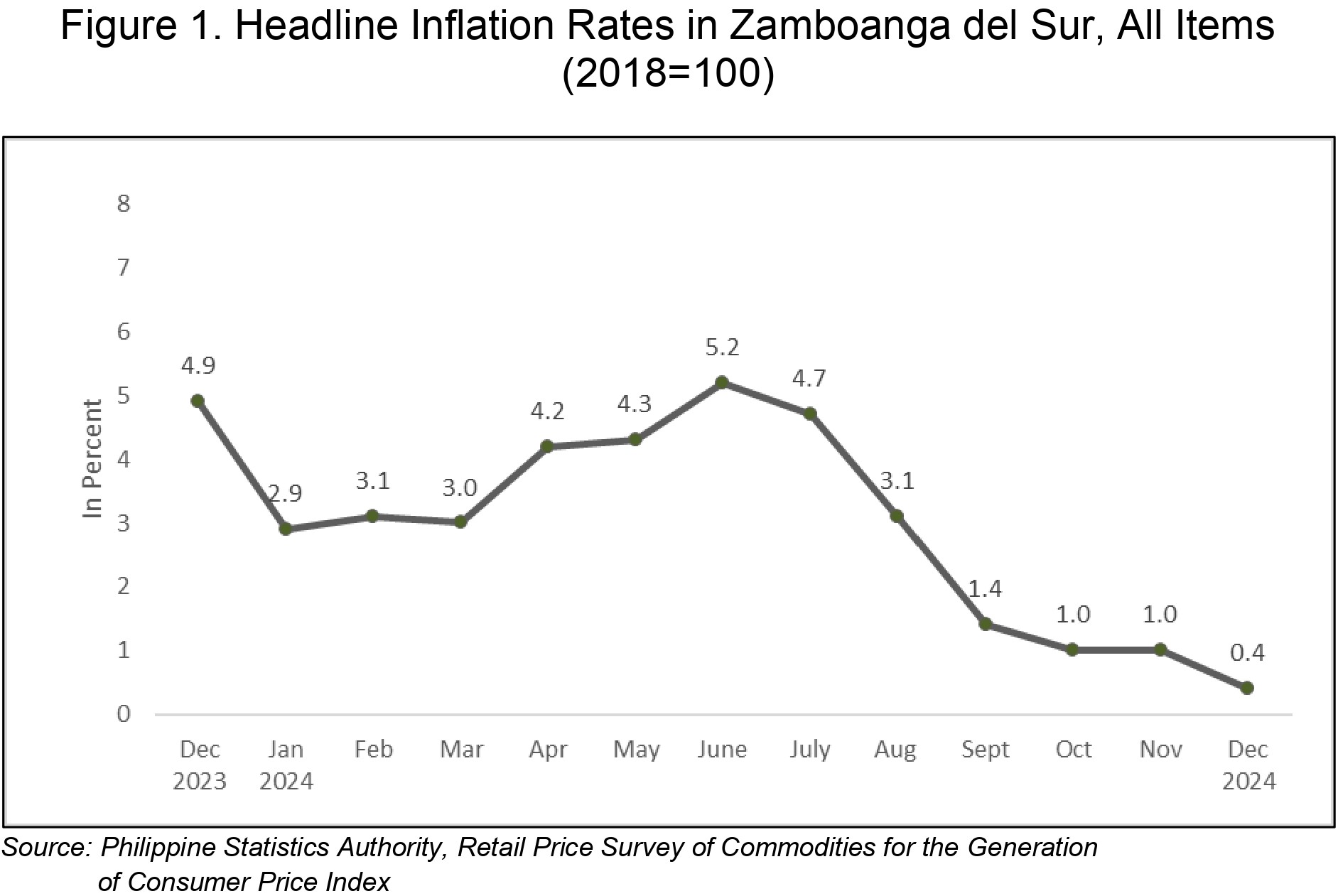
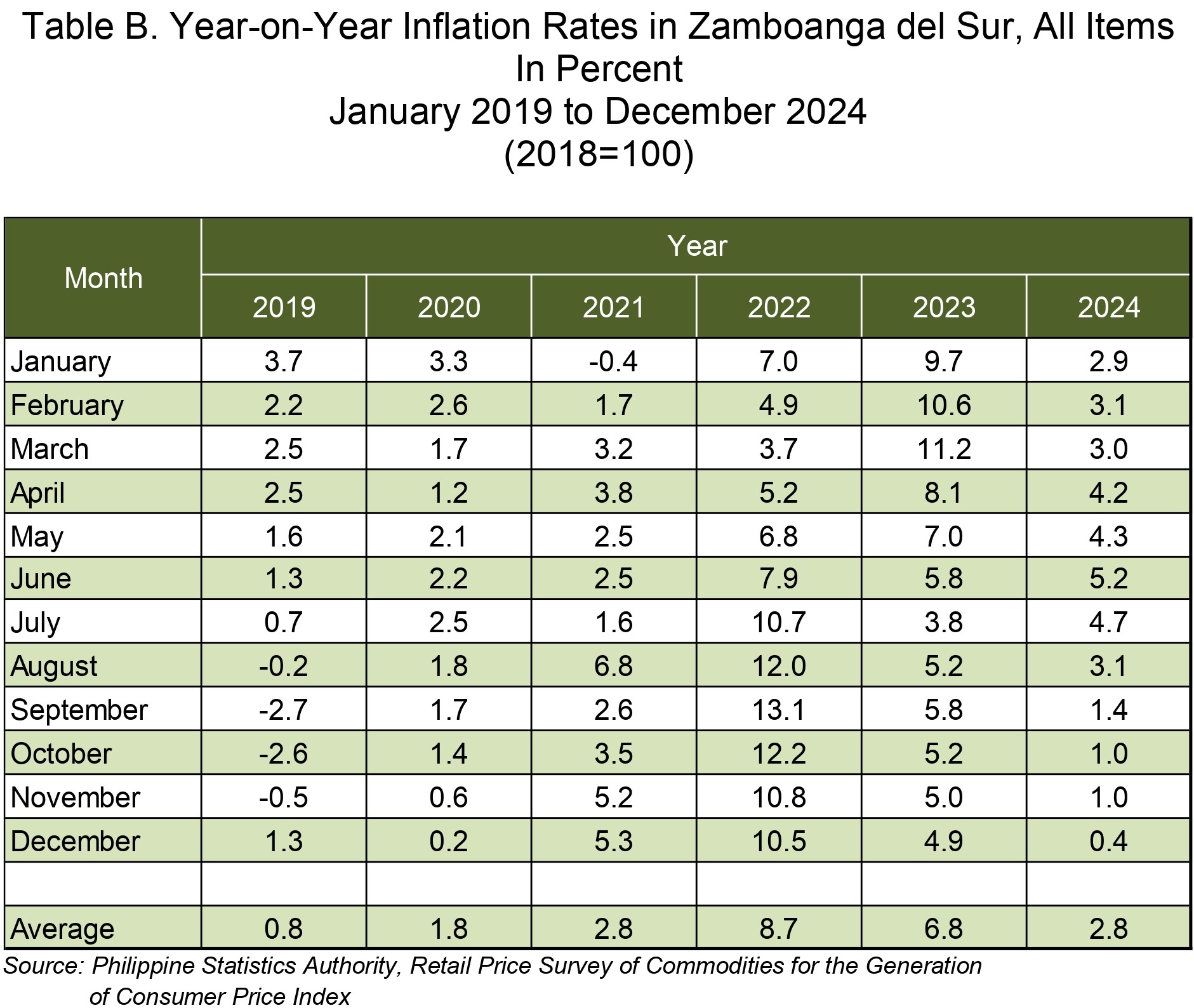
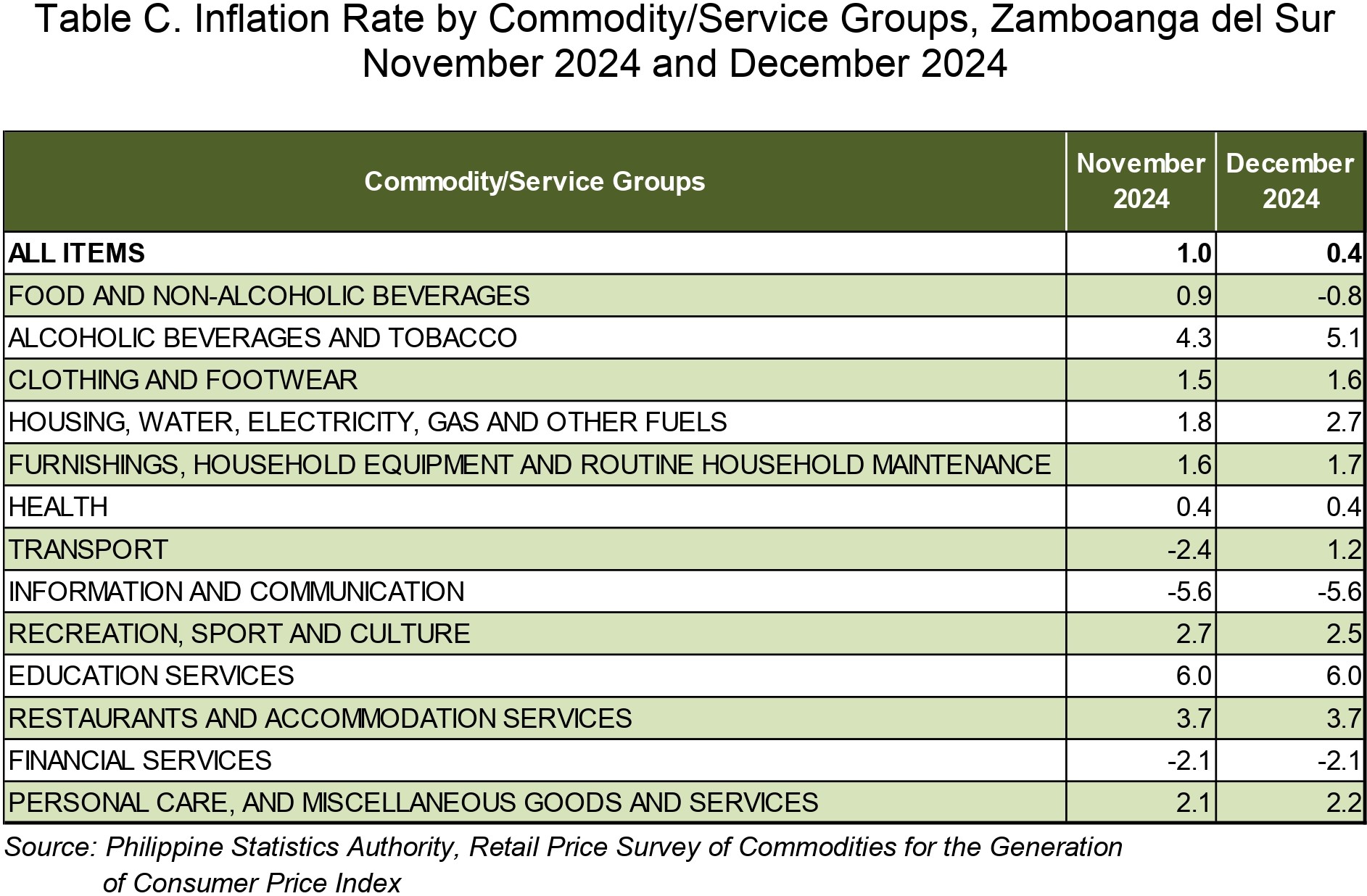
1.1 Main Drivers to the Downtrend of the December 2024 Headline Inflation
The downtrend in the headline inflation in December 2024 was primarily influenced by the faster year-on-year decline in the heavily weighted food and non-alcoholic beverages at 0.8 percent during the month from an increase of 0.9 percent in November 2024. The slower annual increase of recreation, sport and culture at 2.5 percent during the month from 2.7 percent in November 2024 also contributed to the downtrend.
In contrast, the following commodity groups registered higher inflation rates during the month:
a. Alcoholic beverages and tobacco, 5.1 percent from 4.3 percent;
b. Clothing and footwear, 1.6 percent from 1.5 percent;
c. Housing, water, electricity, gas and other fuels, 2.7 percent from 1.8 percent;
d. Furnishings, household equipment and routine household maintenance, 1.7 percent from 1.6 percent;
e. Transport, 1.2 percent from -2.4 percent; and
f. Personal care, and miscellaneous goods and services, 2.2 percent from 2.1 percent.
The indices of health, information and communication, education services, restaurants and accommodation services, and financial services retained their previous month’s annual increment. (Table C)
1.2 Main Contributors to the December 2024 Headline Inflation
The top three commodity groups contributing to the December 2024 overall inflation were the following:
a. Housing, water, electricity, gas and other fuels with 84.7 percent share or 0.34 percentage point;
b. Restaurants and accommodation services with 39.0 percent share or 0.16 percentage point; and
c. Alcoholic beverages and tobacco with 24.5 percent share or 0.10 percentage point.
2.0 Annual Average Inflation Rate

The province’s annual average inflation rate for 2024 stood at 2.8 percent, which was lower than the 2023 annual average inflation rate of 6.8 percent. (Table D)
2.1 Main Drivers to the Downward Trend of the 2024 Annual Average Inflation
The downtrend in the 2024 annual average inflation was primarily caused by the lower annual average increase in the index of food and non-alcoholic beverages at 3.8 percent in 2024 from 8.8 percent annual average inflation in 2023. This was followed by housing, water, electricity, gas and other fuels with a faster annual average decrease of 1.1 percent in 2024 from 2.8 percent in 2023. Moreover, transport also contributed to the downtrend as it recorded a lower annual average inflation of 0.5 percent in 2024 from 3.6 percent annual average inflation in 2023.
In addition, the following commodity groups recorded lower annual average inflation rates in 2024.
a. Clothing and footwear, 2.8 percent from 3.6 percent;
b. Furnishings, household equipment and routine household maintenance, 2.3 percent from 5.3 percent;
c. Health, 4.5 percent from 8.8 percent;
d. Information and communication, -3.6 percent from 1.5 percent;
e. Recreation, sport and culture, 3.7 percent from 6.8 percent;
f. Restaurants and accommodation services, 4.8 percent from 6.3 percent;
g. Financial services, -2.1 percent from 0.0 percent; and
h. Personal care, and miscellaneous goods and services, 3.9 percent from 5.8 percent.
In contrast, the following commodity groups recorded higher annual average inflation rates in 2024:
a. Alcoholic beverages and tobacco, 6.9 percent from 6.6 percent; and
b. Education services, 4.3 percent from 1.2 percent.
2.2 Main Contributors to the 2024 Annual Average Inflation
The top three commodity groups contributing to the 2024 annual inflation were the following:
a. Food and non-alcoholic beverages with 75.7 percent share or 2.12 percentage points;
b. Restaurants and accommodation services with 7.7 percent share or 0.21 percentage point; and
c. Personal care, and miscellaneous goods and services with 6.4 percent share or 0.18 percentage point.
3.0 Food Inflation
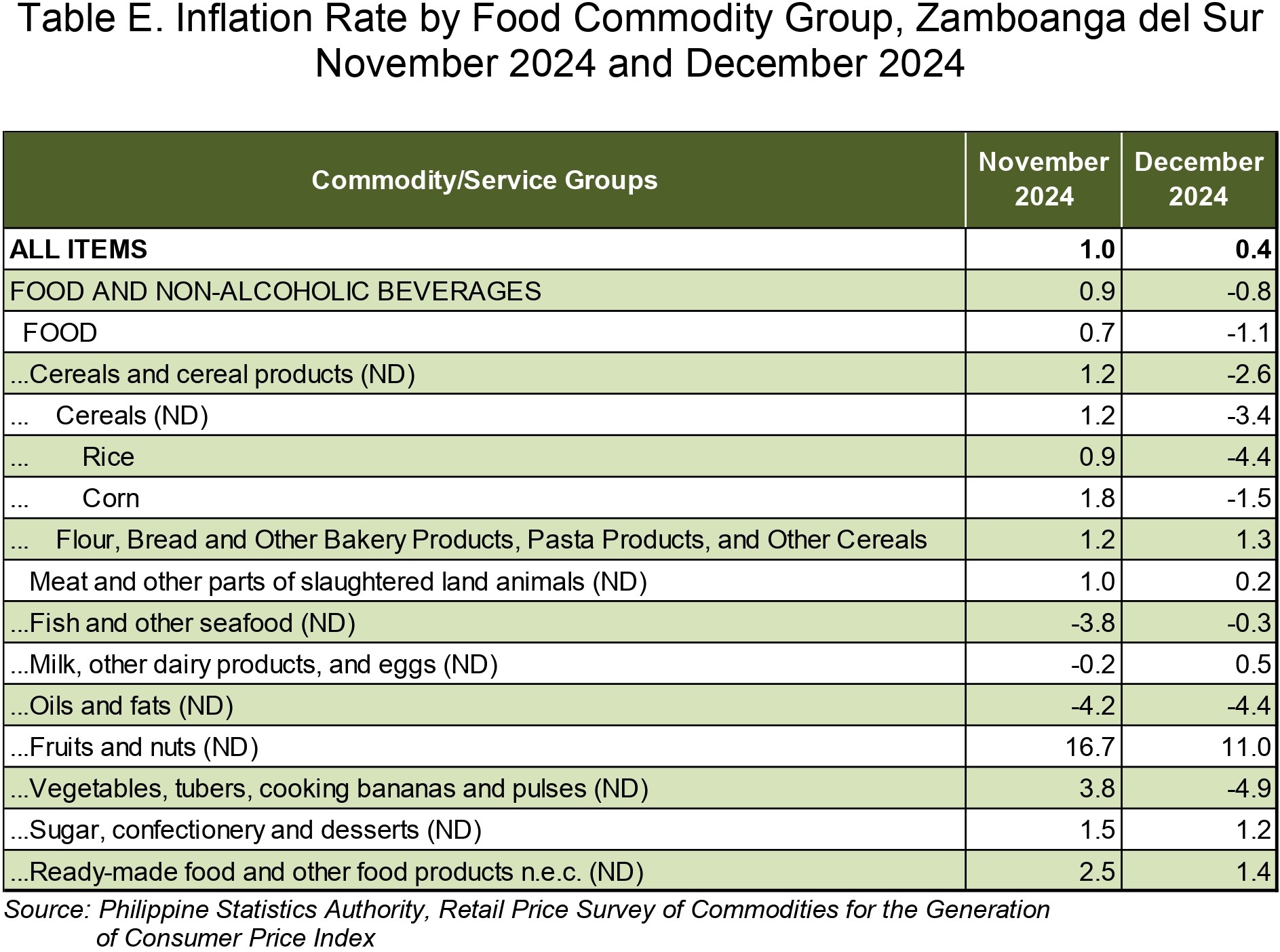
Food inflation in the province declined by 1.1 percent in December 2024 from an increase of 0.7 percent in the previous month.
3.1 Main Drivers to the Downward Trend of Food Inflation
The deceleration of food inflation in December 2024 was primarily brought about by the faster year-on-year decline in the index of cereals and cereal products at 2.6 percent in December 2024 from a growth of 1.2 percent in the previous month. This was followed by vegetables, tubers, plantains, cooking bananas and pulses with a faster annual decline of 4.9 percent during the month from an increase of 3.8 percent in November 2024. Moreover, the index of fruits and nuts also contributed to the downtrend as it recorded a slower annual increase of 11.0 percent during the month from 16.7 percent in November 2024.
In addition, lower annual increments were noted in the indices of the following food groups during the month:
a. Meat and other parts of slaughtered land animals, 0.2 percent from 1.0 percent;
b. Oils and fats, -4.4 percent from -4.2 percent;
c. Sugar, confectionery and desserts, 1.2 percent from 1.5 percent; and
d. Ready-made food and other food products, 1.4 percent from 2.5 percent.
On the contrary, higher year-on-year growths were observed in the indices of the following food groups during the month:
a. Fish and other seafood, -0.3 percent from -3.8 percent; and
b. Milk, other dairy products and eggs, 0.5 percent from -0.2 percent.
3.2 Main Contributors to the Food Inflation
Food inflation shared -150.1 percent or -0.60 percentage point to the overall inflation in December 2024. The top three food groups in terms of contribution to food inflation during the month were the following:
a. Cereals and cereal products, which include rice, corn, flour, bread and other bakery products, pasta products, and other cereals, with 100.0 percent share or -1.10 percentage points;
b. Vegetables, tubers, plantains, cooking bananas and pulses with 32.4 percent share or -0.36 percentage point; and
c. Fish and other seafood with 5.8 percent share or -0.06 percentage point.
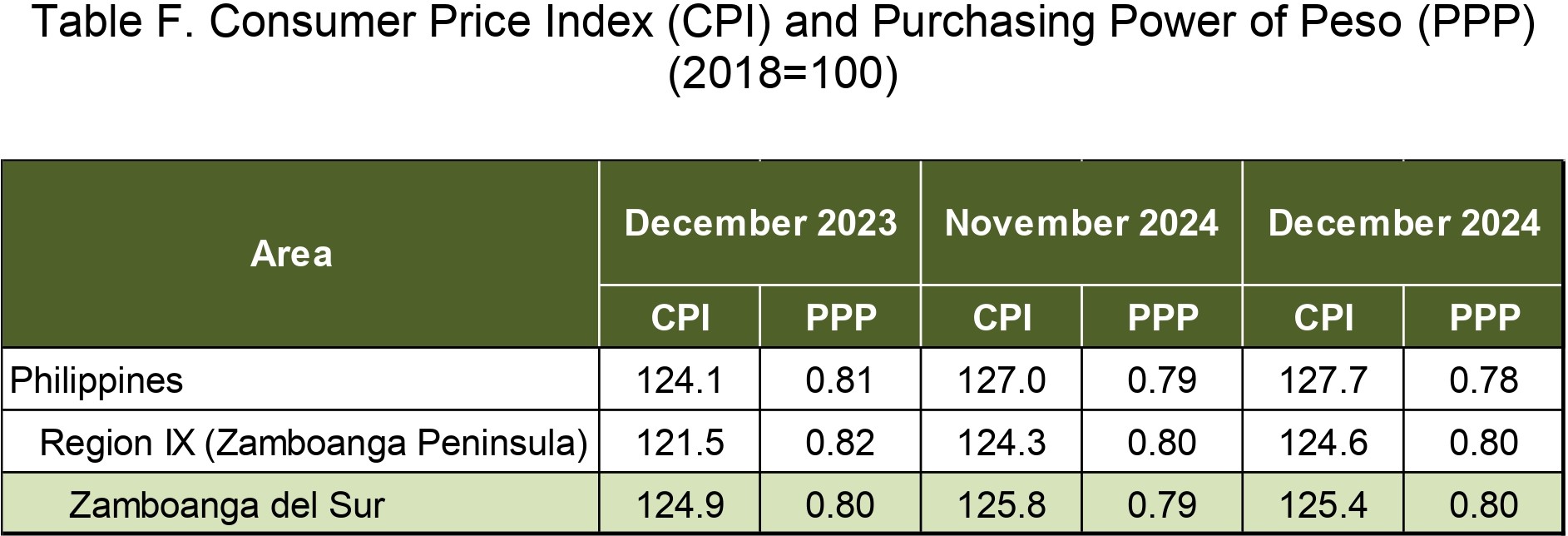
In Zamboanga del Sur, the purchasing power of the peso (PPP) in December 2024 is 0.80. This means that a peso in 2018 is worth 80 centavos in December 2024, or the amount of PhP 100.00 in 2018 is equivalent to PhP 80.00 in December 2024. An additional interpretation is that “You will need PhP 125.40 to purchase the same set of goods and services worth PhP 100.00 in 2018.” (Table F)
DIMNA P. BIENES
(Supervising Statistical Specialist)
Officer-in-Charge
